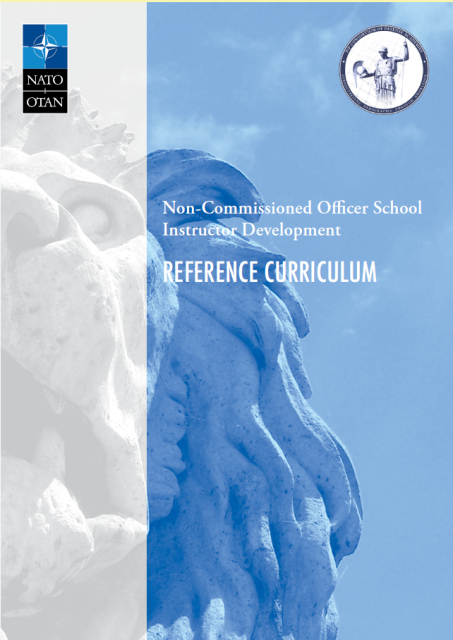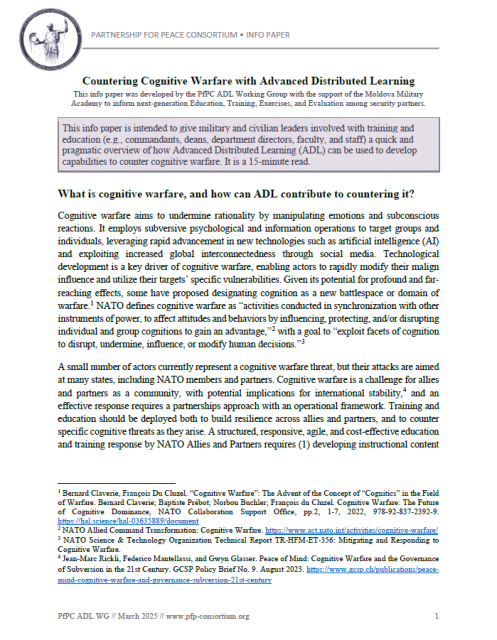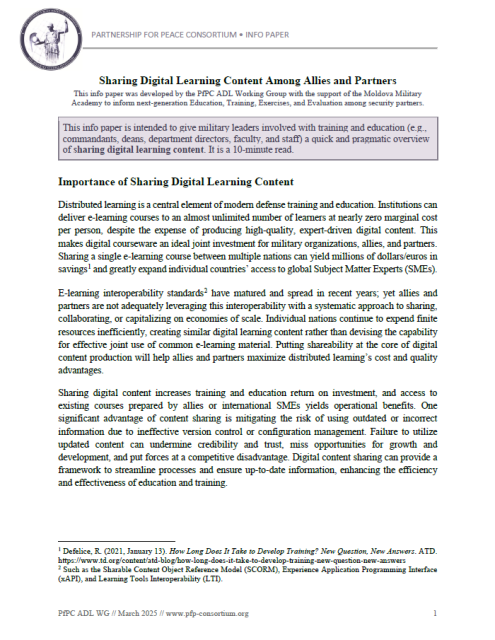
Geneva, Switzerland – The Partnership for Peace Consortium Emerging Security Challenges working group and the Geneva Centre for Security Policy hosted a conference on synthetic biology and Artificial Intelligence Aug. 26-27, 2024. The two-day event explored the interplay between these rapidly advancing technologies and their potential impact on global security.
The conference opened with a comprehensive look at synthetic biology, described as “the art and science of using DNA to make cells do what we want them to do,” or as quoted from Nature Methods (2014), colloquially it could be called, “genetic engineering on steroids.”
Experts highlighted how the integration of synthetic biology and AI is reshaping various industries, particularly healthcare and health sciences, through the development of new medicines and diagnostic tools. For instance, the recent success of RNA vaccines was cited as a prime example. Empowered by AI, synthetic biology can also support more focused toxicology assessments, help us understand self-organizing behaviors in nature, and advance biomanufacturing, including replacing petrochemicals with cell-based materials, engineering biofuels, and growing lab-based meat.
Throughout the discussions, several key themes emerged. Experts highlighted that while synthetic biology offers promising applications, it also poses potential risks. The combination of synthetic biology and AI is making these technologies more accessible, potentially expanding biothreats. Participants emphasized the pressing need for global collaboration and norm-setting in synthetic biology. They stressed the importance of balancing innovation with ethical, responsible use. Additionally, the democratization of these technologies was noted to make regulation increasingly complex, presenting a significant challenge for policymakers and scientists alike.
Biological Weapons and Security Implications
A significant portion of the conference focused on the implications for biological weapons development. Experts discussed the ability to synthetically generate virus families and the challenges of deterrence in the context of bioweapons. The Biological Weapons Convention was highlighted, with participants noting its continued relevance as it approaches its 50th anniversary, despite challenges in verification and keeping pace with rapid technological advancements.
The Gray Zone of National Security
The conference shed light on how genetics is already being exploited in the “gray zone” of national security. Examples included hacking genomic databases and using genetic information for disinformation campaigns, pushing false health alerts to specific groups, using DNA data to profile ethnic groups or for DNA-based targeting, and spreading disinformation about ethically targeted bioweapons. Experts emphasized the need for nations to leverage their scientific communities to debunk false narratives, working in close collaboration with democratically elected governments.
Risk Assessment and Prevention
Experts at the conference warned of a high risk of biosecurity threats in the next five-to-10 years. They emphasized that potential bio-threats extend beyond dramatic human casualties to include economic disruption and environmental hazards. The importance of embedding biosecurity considerations into research projects was stressed, along with the need to involve social scientists and ethicists in synthetic biology research teams. As one expert noted, AI will help us understand more about what makes us human – the patterns encoded in our DNA. This raises crucial questions about the readiness of our international and legal frameworks to address these emerging challenges.
Looking Ahead
The conference concluded by emphasizing the need for continued dialogue and collaboration on these critical issues. Participants underscored the importance of interdisciplinary cooperation, integrating scientific expertise into policymaking, and updating existing frameworks to address emerging technological challenges. As synthetic biology and AI continue to advance, the international community faces the complex task of harnessing their benefits while mitigating potential risks. This conference marks an important step in addressing these challenges and fostering global cooperation in the realm of emerging security threats.
Further Reading
For those interested in delving deeper into these topics, the following resources were recommended: Summary of NATO’s Biotechnology and Human Enhancement Technologies Strategy (2024) and Summary of NATO’s revised AI strategy (2024).
The GCSP Polymath Initiative aims at guaranteeing the responsible use of emerging technologies. Relevant publications about securing synthetic biology, artificial intelligence, and neurotechnologies can be found here. Two relevant publications about synthetic biology are Securing Civilization Against Catastrophic Pandemics and Detect, Delay, Defend: Preparing for the Future in Which Thousands Can Release New Pandemics.
To learn more about the Emerging Security Challenges Working Group, click here.





